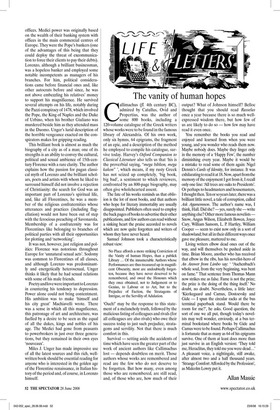The vanity of human hopes
Callimachus (fl. 4th century BC), admired by Catullus, Ovid and Propertius, was the author of some 800 books, including a 120-volume catalogue of the Greek writers whose works were to be found in the famous library of Alexandria. Of his own work, only six hymns, 64 epigrams, the fragment of an epic, and a description of the method he employed to compile his catalogue, survive today. Harvey’s Oxford Companion to Classical Literature also tells us that ‘his is the proverbial saying, “mega biblion, mega kakon” ’, which means, if my rusty Greek has not seized up completely, ‘big book, big bad’, a sentiment to which reviewers, confronted by an 800-page biography, may often give wholehearted assent.
The fate of his works reminds us that oblivion is the lot of most books, and that authors who hope for literary immortality are usually disappointed. Publishers often used to employ the back pages of books to advertise their other publications, and few authors can read without a sinking heart the praise accorded to novels which are now quite forgotten and writers of whom they have never heard.
Samuel Johnson took a characteristically robust view:
No Place affords a more striking Conviction of the Vanity of human Hopes, than a publick Library ... Of the innumerable Authors whose Performances are thus treasured up in magnificent Obscurity, most are undoubtedly forgotten, because they have never deserved to be remembered, and owed the Honours which they once obtained, not to Judgement or to Genius, to Labour or to Art, but to the Prejudice of Faction, the Stratagems of Intrigue, or the Servility of Adulation.
‘Ouch!’ may be the response to this statement of a melancholy truth, followed by the malicious listing of colleagues and rivals (for all colleagues are also rivals) who owe their success today to just such prejudice, stratagems and servility. Not that there is much comfort in this.
Survival — setting aside the accidents of time which have seen the greater part of the work of ancient authors like Callimachus lost — depends doubtless on merit. Those authors whose works are remembered and read are the few who do not deserve to be forgotten. But how many, even among those who are remembered, are still read, and, of those who are, how much of their output? What of Johnson himself? Belloc thought that you should read Rasselas once a year because there is so much wellexpressed wisdom there, but how few of us are likely to do so — how few may have read it even once.
You remember the books you read and enjoyed and learned from when you were young, and you wonder who reads them now. Maybe nobody does. Maybe they linger only in the memory of a ‘Happy Few’, the number diminishing every year. Maybe it would be a mistake to read some of them again: Nigel Dennis’s Cards of Identity, for instance. It was exhilarating to read it at 18. Now, apart from the memory of the enjoyment I got from it, I recall only one line: ‘All trees are oaks to Presidents’. Or perhaps to headmasters and housemasters, I thought then. Ten or so years later, there was a brilliant little novel, a tale of corruption, called Ask Agamemnon. The author’s name was, I think, Hall. Did she? — yes, surely she — write anything else? Other more famous novelists — Snow, Angus Wilson, Elizabeth Bowen, Joyce Cary, William Sansom, L. P. Hartley, William Cooper — seem to exist now only in a sort of shadowland; but all in their different ways once gave me pleasure, mattered to me.
Living writers elbow dead ones out of the way, and will themselves be pushed aside in time. Brian Moore, another who has received that elbow in the ribs, has his novelist-hero of An Answer from Limbo say: ‘ “Aschenbach’s whole soul, from the very beginning, was bent on fame.” That sentence from Thomas Mann now strikes me as false. Fame is not the prize; the prize is the doing of the thing itself.’ No doubt, no doubt. Nevertheless, a little later: ‘Kierkegaard and Camus, Dostoevsky and Gide — I spun the circular racks at the bus terminal paperback stand. Would there be room for me?’, he asks. Good question, the sort of one we all put, though today’s novelists may well wonder, enviously, at a bus terminal bookstand where books by Gide and Camus were to be found. Perhaps Callimachus is fortunate that as many as 64 of his epigrams survive. One of them at least does more than just survive in an English version: ‘They told me, Heraclitus, they told me you were dead...’ A pleasant voice, a nightingale, still awake, after almost two and a half thousand years. ‘Strange Comfort Afforded by the Profession’, as Malcolm Lowry put it.


















































































 Previous page
Previous page